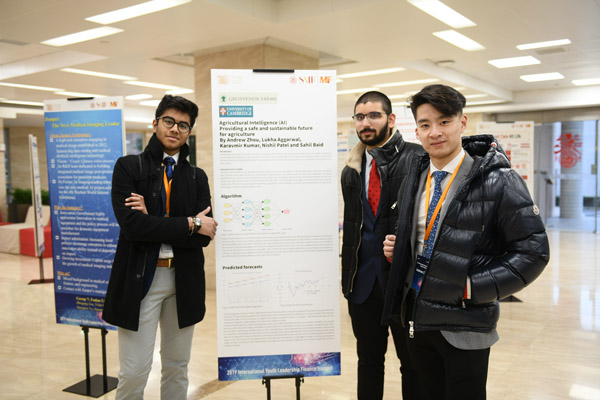Learning to make a business case


Five students from Xi'an Jiaotong University won the top prize in the competition and shared a monetary award of 10,000 yuan ($1,485).
Students from Shanghai Jiao Tong University, Xi'an Jiaotong University, Peking University, McGill University in Canada and the London School of Economics and Political Science won in separate industry categories.
Yootha Tiki Yong, a second-year student at LSE, says it was her second time at the event.
The economics major, who's working as an intern in a fintech bank, says the AI theme was attractive.
"Also, it was great to meet with people from different countries and backgrounds, such as computer science, engineering, physics, and we could see what people said from different perspectives rather than just finance," says Yong.
Her team chose Babylon Health, a UK-based company specializing in the medical industry, for their project.
Yong says they used AI in natural language processing where a patient talks to the machine and it feeds the information back to a database so the machine learns and talks to the patients.
"I think there's so much potential profit in the project and there is a shortage of doctors and a need for more healthcare in China. Some people, even now, don't have adequate access to healthcare," she says.
The team from McGill University chose Cargill, a US-based grain company that recently opened its office in China, to use AI to increase soybean production.
Speaking about the choice of Cargill, John Wu, 22, a fifth-year computer engineering major at the university, says: "One of China's aims is to modernize its agricultural sector. From my personal perspective, I have many family members in China who are farmers."
Another member from the McGill team, Pentcho Tchomakov, says that they did research on what other countries had done with AI to help alleviate the problems in agriculture, and tried to use several technologies by combining them.
Tchomakov explains: "People in China use a lot of tablets and smartphones, so we thought that if we had a user-friendly app for farmers, it could help them make decisions based on actual statistics."
For soybean production, he says, there are several factors, including how deep farmers sow the seeds, how much water they use, and how much rain or sun the crop needs. Therefore, sensors have to be placed in the soil to measure this.
"The system, after evaluating the weather forecast, can tell farmers which seed to use and how deep to sow the seeds," Tchomakov says.
Also, with drones, crops can be monitored for signs of drought or disease before human eyes can see them, the team says.
"Typically, a farmer checks the leaves for signs of trouble, but the leaves in the middle of the field may not look the same as the ones on the edges of the plot, but when you have a view from above, you get the whole picture," says Tchomakov.
The contestants say they learned a lot from the judges in terms of how to present their business plans to win investment.
Wang Yining, a contestant from the Antai College of Economics and Management of Shanghai Jiao Tong University, says: "They told us that we need to look at the presentation more from the investors' perspective. What finally made them decide whether to invest was not only the product, but also how much they could profit from the investment."
Hu Jie, one of the judges and a professor of practice at SAIF, says that for the students from the engineering and technology backgrounds, they need to pay more attention to convey a sense of business in their presentations.
"Some contestants focused on explaining their advanced technology but it was like talking to investors as if they were scientists. Investors care about whether this is going to be a good business project and generate a return on investment," says Hu, who was also a former chairman and CEO of Xunlei BigData and Xunlei Finance.
Contact the writer at [email protected]




































